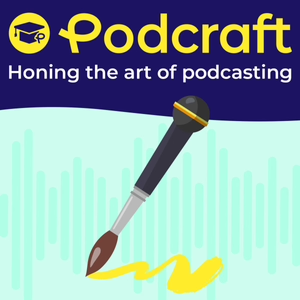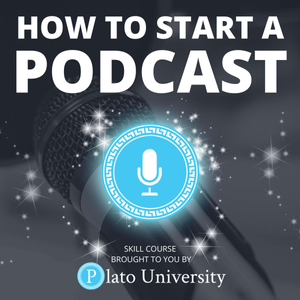
Building a Collaborative Creative Team - Tips for Working with Living Composers with Rachel Howley
12/16/21 • 43 min
What if orchestras in Beethoven's time weren't interested in performing 🅽🅴🆆 🅼🆄🆂🅸🅲?
One of the great advantages of performing works by living composers is that we can ask them questions. A conductor’s job is largely deciphering the composers’ intentions, translating the knowledge into our gestures, and conveying to the musicians to realize the music together. However, the composers’ intentions are not always clear from the score. It can come from editorial mistakes or the composer’s own inconsistency, and of course, the more we know and learn about the composer’s own personality and background, the better we can speak the language for them.
However, not everyone loves working with living composers. There are many reasons -- some might feel that the newly composed works haven’t made it through the test of history, as we say in Chinese, that they are not as worthy. Some people simply don’t enjoy working with composers as the score and parts might not be as readily engraved in some cases. Some conductors do not like having another dictator to the rehearsal process, and there will be people who just tell you that they don’t like new music -- it’s not their taste.
My guest today Rachel Howley and I will share our experience working with composers on premieres and beyond, and we both found this process really rewarding, especially when you are working with educational ensembles. Even if you work primarily with professional groups -- remember all music was once new. If orchestras in Beethoven’s time weren’t kin to programming new works, we wouldn’t have had so many masterworks now.
Rachel Howley is a music educator, conductor and researcher. She is the founding Director of Grace Academy at Grace Lutheran College, a leading educational institution in Performing Arts in Queensland, Australia. She is also a conducting staff with the Queensland Wind Orchestra, and regularly guest conducts throughout the area.
Rachel is a current Doctor of Musical Arts candidate, studying conducting with Dr. Peter Morris at the Queensland Conservatorium Griffith University. Her research explores the role of the conductor in championing the wind band works of Australian female composers. She is also an active advocate for encouraging diversity and fair gender representation through the selection of repertoire. Through her research, she has commissioned several new works and facilitated partnerships between emerging composers and Australian publishing companies.
What if orchestras in Beethoven's time weren't interested in performing 🅽🅴🆆 🅼🆄🆂🅸🅲?
One of the great advantages of performing works by living composers is that we can ask them questions. A conductor’s job is largely deciphering the composers’ intentions, translating the knowledge into our gestures, and conveying to the musicians to realize the music together. However, the composers’ intentions are not always clear from the score. It can come from editorial mistakes or the composer’s own inconsistency, and of course, the more we know and learn about the composer’s own personality and background, the better we can speak the language for them.
However, not everyone loves working with living composers. There are many reasons -- some might feel that the newly composed works haven’t made it through the test of history, as we say in Chinese, that they are not as worthy. Some people simply don’t enjoy working with composers as the score and parts might not be as readily engraved in some cases. Some conductors do not like having another dictator to the rehearsal process, and there will be people who just tell you that they don’t like new music -- it’s not their taste.
My guest today Rachel Howley and I will share our experience working with composers on premieres and beyond, and we both found this process really rewarding, especially when you are working with educational ensembles. Even if you work primarily with professional groups -- remember all music was once new. If orchestras in Beethoven’s time weren’t kin to programming new works, we wouldn’t have had so many masterworks now.
Rachel Howley is a music educator, conductor and researcher. She is the founding Director of Grace Academy at Grace Lutheran College, a leading educational institution in Performing Arts in Queensland, Australia. She is also a conducting staff with the Queensland Wind Orchestra, and regularly guest conducts throughout the area.
Rachel is a current Doctor of Musical Arts candidate, studying conducting with Dr. Peter Morris at the Queensland Conservatorium Griffith University. Her research explores the role of the conductor in championing the wind band works of Australian female composers. She is also an active advocate for encouraging diversity and fair gender representation through the selection of repertoire. Through her research, she has commissioned several new works and facilitated partnerships between emerging composers and Australian publishing companies.
Previous Episode

Becoming La Maestra with Rebecca Tong
Competitions Are for Horses, Not for Artists?
Today we are going to discuss a sensitive and yet, somehow controversial topic - music competition. Composer Bela Bartok‘s famous quote says, “Competitions are for horses, not artists.” However, some of us, including myself, dream about winning a major competition and then have a career that just takes off at times.
Professional ensembles, agents, or businesses continue to organize conducting competitions, and we continue to enter them because we are seeing people successful through this route. However, we are not seeing those who won a competition without a major career, not to mention those who tried, also worked hard, perhaps equally talented or qualified but didn’t win the glory. We only see the flamboyant and sparkling part of the business.
With the pressing call for more diversity in the conducting field, la Maestra was the first conducting competition for women only, which was held in March 2021 in Paris amidst Covid-19. My guest today is the winner of the inaugural La Maestra Competition, Rebecca Tong, and she will share her journey before, during, and after the competition with all of us.
Rebecca is Resident Conductor of Jakarta Simfonia Orchestra and is Artistic Director and Music Director of Ensemble Kontemporer. She recently completed her two-year tenure as Junior Fellow in Conducting at the Royal Northern College of Music, and previously studied at Cincinnati Conservatory of Music. During her studies, Rebecca worked extensively in assisting the BBC Philharmonic and the Royal Liverpool Philharmonic Orchestra, and frequently collaborates with the Hallé Orchestra and Manchester Camerata.
Next Episode

Family and Community Centered Artistry with Kristin Roach
The pandemic has taught us a lot of things. Many of us lost their loved ones, and some of us had a chance to reflect on their relationships with others.
Being forced at home gave some people a chance to spend more time with their families, while some others couldn’t see their loved ones for months because of Covid related travel restrictions or other concerns.
In today’s episode, I will be exploring the topic of a family centered career trajectory with my friend Kristin Roach. Kristin will share with us how she fostered her relationship with her family while creating projects around her homebase, San Antonio, Texas. We will also discuss challenges in the career as a working and traveling parent, and how you can make it work by owning your decisions and taking responsibility resulting from your choices.
Kristin is a Grammy-nominated pianist and international conductor with 37 new operas and 21 world premieres under her baton. Her high level of artistry, comprehensive knowledge of operatic repertoire and performance practices, and strong communication, management, motivational, and organizational skills place her in demand as a conductor, pianist, and vocal coach across the nation. She currently serves as Assistant Professor of Opera at Lawrence University, and conductor at Vocal Academy of Orvieto, and maintains a busy private practice as vocal coach and award-winning pianist with extensive collaboration.
As Founding Music Director of Alamo City Opera, Kristin conducted 17 productions of operas, including many South Texas premieres. A San Antonio native, she partnered with founder and General Director, the late Mark Richter, to help ACO establish an atmosphere of intimate opera with diverse and ground-breaking programming, which drew hundreds of audience under the age of 35, and many of whom were first-time opera-goers.
If you like this episode you’ll love
Episode Comments
Generate a badge
Get a badge for your website that links back to this episode
<a href="https://goodpods.com/podcasts/the-conductors-podcast-395393/building-a-collaborative-creative-team-tips-for-working-with-living-co-55723889"> <img src="https://storage.googleapis.com/goodpods-images-bucket/badges/generic-badge-1.svg" alt="listen to building a collaborative creative team - tips for working with living composers with rachel howley on goodpods" style="width: 225px" /> </a>
Copy




